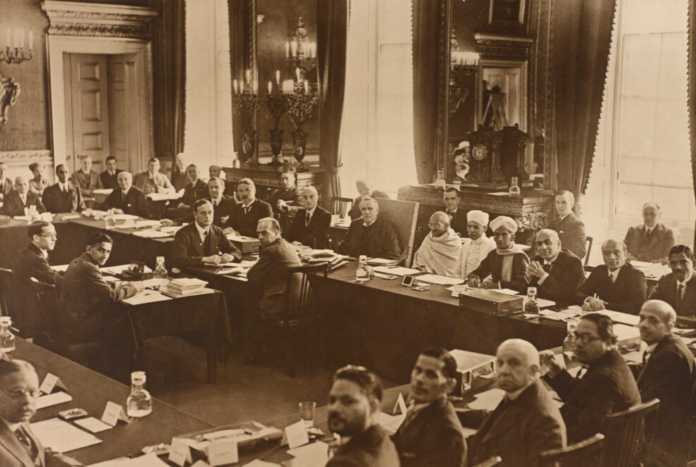The Round Table Conferences were a series of three meetings held in London between 1930 and 1932 to discuss the future of India’s governance. The conferences were organized by the British government in response to growing demands for Indian independence and the recommendations of the Simon Commission, which had been appointed to investigate constitutional reform in India.
The first Round Table Conference was held from November 12, 1930, to January 19, 1931. It was attended by 73 delegates from all Indian states and all political parties except the Indian National Congress, which was boycotting the conference in protest of the Simon Commission’s report. The main issues discussed at the first conference were federation, provincial autonomy, and minority representation.
The second Round Table Conference was held from September 7, 1931, to December 1, 1931. It was attended by 89 delegates, including Mahatma Gandhi, who represented the Indian National Congress. The main issues discussed at the second conference were the powers of the central government, the composition of the legislature, and the safeguards for minorities.
The third Round Table Conference was held from November 17, 1932, to December 24, 1932. It was attended by 63 delegates. The main issues discussed at the third conference were the franchise, the composition of the judiciary, and the financial system.
The Round Table Conferences did not achieve their goal of reaching a consensus on the future of India’s governance. However, they did make some progress in terms of narrowing the differences between the British government and Indian political leaders. The conferences also helped to raise the profile of the Indian independence movement and to build international support for Indian self-rule.
Here are some of the key outcomes of the Round Table Conferences:
- The Government of India Act 1935, which introduced provincial autonomy in India.
- The creation of the Federation of India, which was to have come into being in 1939 but was never implemented.
First Round Table Conference (1931)
-
- Held on 12th November 1930 in London to discuss Simon Commission.
- Hindu Mahasabha and Muslim League participated, but the absence of the Indian National Congress led to its failure.
Gandhi-Irwin Pact (1931):
-
- Signed on 5th March 1931 between Lord Irwin’s government and INC led by Gandhiji.
- Called off the Civil Disobedience Movement.
- INC agreed to join the Second Round Table Conference.
- Government allowed coastal villagers to make salt for consumption and released political prisoners.
Background for the First Round Table Conference
- There were increasing demands of granting dominion status to India among a certain section of the British polity.
- In India, the freedom movement was in full swing with its demand for swaraj or self-rule, spearheaded by the charismatic Gandhi.
- The conferences were based on the recommendation of Muhammad Ali Jinnah to Lord Irwin, the then Viceroy of India, and James Ramsay MacDonald, the then British Prime Minister, and the Simon Commission report.
- It was for the first time that the Indians and the British were meeting as ‘equals.’
- The first conference started on November 12th, 1930.
Second Round Table Conference (1931):
-
- Gandhiji represented the INC in London, meeting British Prime Minister Ramsay McDonald.
- The conference failed due to disagreements, especially on Communal Representation and the refusal of the British Government to address the basic Indian demand for freedom.
The Communal Award (16th August 1932)
-
- Announced by Ramsay McDonald, revealing the divide and rule policy.
- Envisaged communal representation for depressed classes, Sikhs, and Muslims.
- Gandhiji opposed it, initiating a fast unto death in Yervada jail, Pune.
Poona Pact/ Gandhi-Ambedkar Pact (25th September 1932)
-
- Abandoned the idea of a separate electorate for depressed classes.
- Increased reserved seats for them in the Provincial Legislature.
- Agreed upon a joint electorate for upper and lower castes.
Third Round Table Conference (1932):
-
- Proved fruitless as most national leaders were in prison.
Participants of the Third Round Table Conference
- Only 46 delegates in total took part in this conference.
- The INC and the Labour Party decided not to attend it. (The INC wasn’t invited).
- Indian princely states were represented by princes and divans.
- British Indians were represented by the Aga Khan (Muslims), Depressed classes, women, Europeans, Anglo-Indians, and labour groups.





